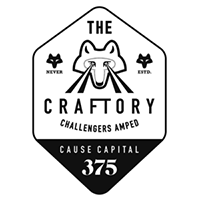When Will Socially Conscious Investing Go Mainstream?
The Craftory vision is to invest in socially conscious brands. Photo by Mr TT on Unsplash
At The Craftory we know that business is more than just about making a profit. It’s important to us all for your business to make money, but we want to make a profit, sustainably.
We are currently witnessing a wave of rebel entrepreneurs looking to build their companies on this sense of a higher purpose. We want to deep dive into this trend and ask you, our cause-driven community, when will socially conscious investing finally go mainstream?
After the 2008 global financial crisis, the world saw a seismic shift in the financial industry’s moral compass towards socially responsible investment. Legislation strengthened in 2015 as governments set increasingly ambitious targets based around the UN’s Sustainable Development Goals and the Paris Climate Agreement and the private sector played their part with banking and asset management financing growing numbers of sustainability projects and promoting positive corporate practices since 2008.
Today, investors and businesses are increasingly conscious of the social and environmental consequences of the decisions they make. Pair this with regulatory drivers and a deepening understanding of the impact of factors such as climate change or mental health, we can clearly see the need to integrate environmental, social and governance criteria (ESGs) into investment models.
For The Craftory, this is business as usual. But why isn’t the case for everyone?
Let us clear a few things up:
‘Conscious’ investing is not a new concept, yet there is often confusion around terminology. Generally speaking, any investment strategy that considers the social and environmental impact, as well as financial return, is a socially responsible investment. To The Craftory, this means being accountable, being mindful and aware, and shaking up that status quo!
Sounds good, right? And it is!
Socially conscious investment can help to push the financial industry in the right direction. Companies have to answer consumer demands for more sustainable business models and they have to adjust their strategies to meet government-led environmental goals. In turn, investors have to meet the needs of these companies. And together, this should encourage corporate practices that promote environmental stewardship, human rights, consumer protection and diversity.
On top of this, the direct relationship between ESG investments and positive returns is still being explored, however, evidence is mounting that such businesses outperform traditional businesses in financial terms. ESG investing is also becoming a viable way to strengthen risk management with the risks relating to ESG issues having an increasingly significant impact on a company’s market value, particularly with regards to reputation and future-proofing against legislation.
As demand increases and a younger generation of investors move into the market, a focus on ESG issues is a surefire way to align organisational strategy with new stakeholder priorities. Two-thirds of high-net-worth millennials surveyed in the United States agreed with the statement, “My investment decisions are a way to express my social, political, or environmental values.”
Using current trends, Pictet Asset Management estimates that ESG assets will comprise of around 31% of assets managed by global funds by 2020 (up from 24% in 2016). So, things are improving but genuinely sustainable and socially responsible investing is still too far from the mainstream for our liking.
Old habits die hard ...
Before we can hope for socially conscious investing to just be investing, there is one major hurdle to overcome: perceived performance. The biggest barrier that fund managers and investors face is actually proving that socially responsible investments won’t come at the expense of good returns.
However, contrary to widespread opinion, a 2016 paper compiled by Swiss bank UBS of 2,200 studies showed that 90% of ESG investments made since the 1970s showed no negative performance vs. traditional approach, with many of the studies actually showing a positive performance that was stable over time.
Still, in the world of investment, old habits die hard.
The Craftory way:
To change this, we need to end short-termism in the financial industry for good. The constant pressure to meet or beat unrealistic benchmarks that don’t factor in how the business builds over time is an obstacle in the way of truly sustainable investments. Small challenger brands often require longer fund horizons to realise their goals (for both returns and sustainability goals). Socially responsible investment is not always about instant value, but you can be damn sure there is long-term, high value in sustainable businesses.
At The Craftory, we know there isn’t anything mutually exclusive about doing good and making money. We are here for responsible, mission-driven businesses because business can be a force for good. In fact, you could say that free enterprise capitalism is one of the best ideas humans have ever had. But we want to demand more and socially conscious investing is how we finally get the financial industry to reflect what we want the world to look like.
Our approach is a wake-up call for the investing industry; we must take bold steps to release the hold of fixed multiples and short time horizons and get a truly holistic understanding of your business.
We need to change the mindset of the investment community, there must be a broader conversation so that socially responsible investing works the way businesses and investors want it to. It can just be investing.
If you’re running a successful, socially conscious brand we’d like to know.
Tell us about your brandThis post was co-written by JP Thurlow and Alice Schulz
Alice Schulz is a Content Specialist at Semetrical the digital and content marketing agency.
JP is Craft Partner for Brand and Storytelling at The Craftory, the alternative investment house on a $375M mission to back the world's boldest CPG challenger brands.



